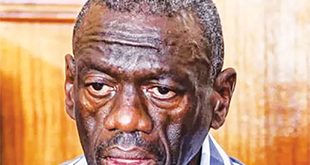
By Henry Zakumumpa
How poor African countries unwittingly develop rich western countries
About three months ago, the local press was awash with reports of a raging debate in parliament about Uganda’s proposed borrowing from China to build the Karuma hydro power dam. The legislators maintained that this would exhaust Uganda’s external debt ceiling currently standing at over US$5 billion or about 25% of Uganda’s GDP.
Uganda is heavily dependent on foreign credit to finance virtually all major infrastructure projects. Think here of the proposed new Jinja bridge, the Masaka-Mbarara road, and even the newly built Wandegeya market!
Over the past few days of this Christmas holiday, I was finally able to read a book recommended to me by Peregrine Ssebulime that is instructive for Uganda and other credit-dependant countries.

As Africans, we have been led to believe that African states are propped up by loans and foreign money from the west.
A bold recent book however challenges this widely-held perception by providing stunning economic evidence that African countries are actually net creditors to the rich industrialised world.
Put in lay man terms, the book’s central argument is that more money leaves Africa to the west than comes into Africa from the west in form of loans.
The book entitled ‘Africa’s odious debts: How foreign loans and capital flight bled a continent’’ was authored by Léonce Ndikumana and James Boyce, Economics professors at the University of Massachusetts at Amherst. The former is actually Burundian.
The book is no idle polemic but provides hard economic data most of which has already been published in academic journals since 2001.
Leonce Ndikumana should know. He holds a doctorate in Economics from University of Washington at St Louis and was head of research at the African Development Bank from 2008 to 2011.He was also Chief of Macroeconomic analysis at the United Nations Economic Commission for Africa from 2006 to 2008.
In an article the authors published in the Journal of Development studies in 2001 titled’ Is Africa a net creditor?’, the authors write: ‘’We found that capital flight from 25 low-income African countries over the 1970-96 period amounted to US$193 billion(and to $ 285 million including imputed interest earnings) comparing to this to the US$178 billion in external debt to the same set of countries, we concluded that Africa is a net creditor to the rest of the world: the external assets of these countries exceeded their external debts’.
Here is how Ngozi Okonjo-Iweala Nigeria’s Finance Minister put it 2005: ‘’We make annual debt repayments of more than US$1.7 billion, three times our education budget and nine times our health budget’’. The authors estimate that poor countries ‘’are spending roughly the same amount on debt service as they spend on public health’’.
Compounding the outrage is the empirical fact that most of loans borrowed by African countries end up in private pockets while the loans of course; remain publically-held by African states-for generations.
The book discusses compelling case studies of Mobutu Sese Seko’s Zaire and Fernando Marcos’ Philippines. In a memorable story from the Philippines, US$2 billion was borrowed from US Export-Import Bank and a Citibank and American Express consortium to build a nuclear energy plant that never produced even an ounce of electricity yet Philippines went on to pay billions of dollars in loan repayments. The trouble, partly, was that the nuclear plant was built on a site prone to earthquakes!
and a Citibank and American Express consortium to build a nuclear energy plant that never produced even an ounce of electricity yet Philippines went on to pay billions of dollars in loan repayments. The trouble, partly, was that the nuclear plant was built on a site prone to earthquakes!
The book highlights the complex behind-the-scene dealings at multilateral lenders such as the IMF which was arm-twisted by the US government to lend to Mobutu’s Zaire contrary to its’ own assessment. Not altogether strange if you have read similar tales in the frame of ‘Confessions of an economic hit man’.
The notion that the west has taken more out of Africa than the other way round is hardly original. It has been previously harped by economic historians and anti-colonialism African intellectuals. This book, however, is hard empirical proof of this contemporary African reality of a hemorrhaging continent. One mortgaged by its elites in lots of needless borrowing with many in the west on the take.
‘’The lines between thievery and patriotism, between private advantage and national interest, become impossibly blurred’’ sums up one writer.
Henry Zakumumpa works with Makerere University.
zakumumpa@yahoo.com
 The Independent Uganda: You get the Truth we Pay the Price
The Independent Uganda: You get the Truth we Pay the Price


